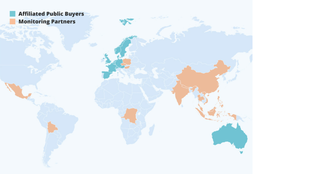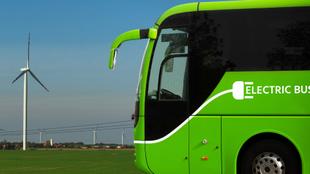Highlights of 2023
As we begin a new year and prepare to publish our Strategic Plan for 2024-2028, we look back on some of Electronics Watch's highlights and achievements in 2023.
It's been a year of both consolidation and growth for the organisation. We've increased our staff and the number of affiliated public buyers and monitoring partners we work with.
Supporting public authorities to protect the rights of workers in their supply chains
As the number of our affiliates grew to over 1,500 organisations so did our efforts to build their capacity and exercise their leverage. During 2023, we increased one-on-one support calls, introduced quarterly updates on monitoring findings, created two new working groups, and standardised the initial risk assessment process. These efforts have helped affiliates to contribute to more effective human rights due diligence in their supply chains, including greater transparency and accountability.
Transparency is critical
Twice as many brands disclosed their suppliers to affiliates in 2023 than in 2022, doubling the number of new factories added to our supply chain database year-over-year. For example, a year ago we had 20 brands disclosing their suppliers, whereas today we have 43. While last year our supply chain database covered 17 countries and less than 100 factories, it now includes 250 factories in 27 countries around the world.
Working for a Just Transition
In 2023, we continued to develop our Low Emission Vehicle (LEV) Programme with 10 participants who include some of the major public transport companies in Europe. This work supports a Just Transition by ensuring that climate solutions do not come at the expense of human rights. It has meant intensifying our monitoring of mineral mines: as part of a project funded by EPRM and Barcelona City Council, our staff visited tin mines in Bolivia and cobalt mines in the Democratic Republic of Congo, key minerals used to produce electric vehicle batteries.
Although the automotive sector is relatively less mature than others when it come to human rights and environmental due diligence and supply chain transparency, progress is well under way. Public buyers have significant leverage, and vehicle companies are listening to them: together with programme participants, we engaged 11 companies in individual dialogue this year. These discussions laid the groundwork for participants to pursue factory disclosures with their LEV suppliers in 2024, an important step toward identifying and assessing risks.
Grievance mechanisms and worker-driven remedy
The concept of remedy is one that has been largely neglected or misunderstood for many years, with little common ground among stakeholders on what it is or should be, or how to get there. In 2023, we made some exciting progress towards achieving remedy for workers.
We kicked off a collaboration with the GIZ's Initiative for Global Solidarity to expand access to grievance mechanisms for workers across multiple countries. As part of this effort, we delivered trainings to our monitoring partners and trade unions, whom we are engaging more consistently and systematically in our work. Our collaboration with free and democratic unions reinforces their authority to represent workers, including by pursuing and monitoring remedy for workers who have been harmed.
In consultation with public buyers, trade unions, NGOs and academic partners, we also developed a set of Worker-Driven Remedy Principles that put workers at the centre of remedy processes.
Visibility and accessibility
Our worker-driven monitoring powered the establishment of worker networks in electronics production regions and increased our visibility there. Workers and their representatives learned about Electronics Watch, what we can do to support them, and the public procurement leverage afforded through collaboration between public buyers, monitors and trade unions. This means that more workers have the confidence to turn to our monitoring partners, and sometimes directly to us, seeking assistance and remedy for the issues they encounter in the workplace.
We're proud of what we have achieved in 2023 together with our monitoring partners and affiliated public buyers. Looking ahead to 2024, we will be building on these achievements. We are poised to drive further improvements in tackling modern slavery and human rights and environmental due diligence in public buyers' supply chains based on our impact model – using a worker-centred approach.




